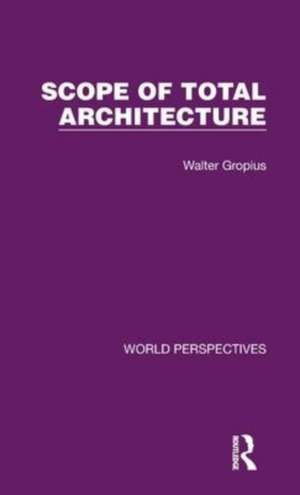Scope of Total Architecture: World Perspectives
Autor Walter Gropiusen Limba Engleză Hardback – 31 dec 2021
| Toate formatele și edițiile | Preț | Express |
|---|---|---|
| Paperback (1) | 385.25 lei 43-57 zile | |
| Taylor & Francis – 19 dec 2023 | 385.25 lei 43-57 zile | |
| Hardback (1) | 695.26 lei 43-57 zile | |
| Taylor & Francis – 31 dec 2021 | 695.26 lei 43-57 zile |
Din seria World Perspectives
-
 Preț: 243.35 lei
Preț: 243.35 lei - 36%
 Preț: 4798.87 lei
Preț: 4798.87 lei -
 Preț: 385.25 lei
Preț: 385.25 lei -
 Preț: 300.54 lei
Preț: 300.54 lei -
 Preț: 297.49 lei
Preț: 297.49 lei -
 Preț: 322.14 lei
Preț: 322.14 lei -
 Preț: 302.84 lei
Preț: 302.84 lei -
 Preț: 307.29 lei
Preț: 307.29 lei -
 Preț: 304.57 lei
Preț: 304.57 lei -
 Preț: 298.41 lei
Preț: 298.41 lei -
 Preț: 297.27 lei
Preț: 297.27 lei
Preț: 695.26 lei
Preț vechi: 817.95 lei
-15% Nou
Puncte Express: 1043
Preț estimativ în valută:
133.08€ • 144.60$ • 111.86£
133.08€ • 144.60$ • 111.86£
Carte tipărită la comandă
Livrare economică 21 aprilie-05 mai
Preluare comenzi: 021 569.72.76
Specificații
ISBN-13: 9781032180977
ISBN-10: 1032180978
Pagini: 190
Ilustrații: 18
Dimensiuni: 138 x 216 x 13 mm
Greutate: 0.37 kg
Ediția:1
Editura: Taylor & Francis
Colecția Routledge
Seria World Perspectives
Locul publicării:Oxford, United Kingdom
ISBN-10: 1032180978
Pagini: 190
Ilustrații: 18
Dimensiuni: 138 x 216 x 13 mm
Greutate: 0.37 kg
Ediția:1
Editura: Taylor & Francis
Colecția Routledge
Seria World Perspectives
Locul publicării:Oxford, United Kingdom
Public țintă
General, Postgraduate, and UndergraduateCuprins
Part 1: Education of Architects and Designers 1. Approach 2. My Conception of the Bauhaus Idea 3. Is There Science in Design? 4. Blueprint of an Architect’s Education Part 2: The Contemporary Architect 5. Appraisal of the Development of Modern Architecture 6. Archaeology or Architecture for Contemporary Buildings? 7. The Architect Within Our Industrial Society 8. Architect – Servant or Leader? Part 3: Planning and Housing 9. CIAM 1928-1953 10. Sociological Premises for the Minimum Dwelling of Urban Industrial Populations 11. Houses, Walk-Ups or High-Rise Apartment Blocks? 12. Organic Neighbourhood Planning 13. Problems of the ‘Core’ (Community Centre) 14. Housing Industry 15. A Way Out of the Housing Confusion Part 4: Scope of Total Architecture.
Notă biografică
Walter Gropius was one of the pioneers of Modernist Architecture and the founder of the Bauhaus School.
Descriere
Originally published in 1956, this book provides a non-technical analysis of contemporary building by on the of the world’s greatest architects. Published a few years after the end of WW2, it was an inspiring and constructive picture of what kind of living could lie ahead for Western industrial society.
